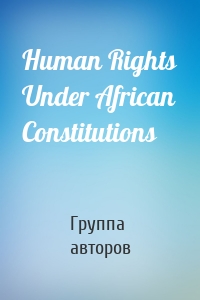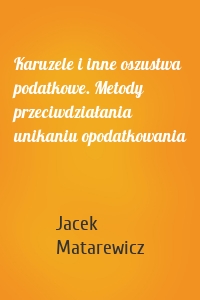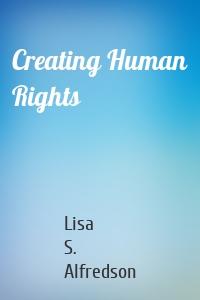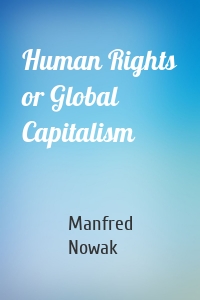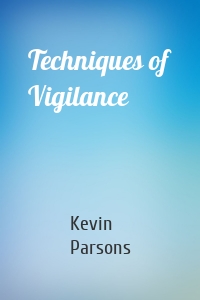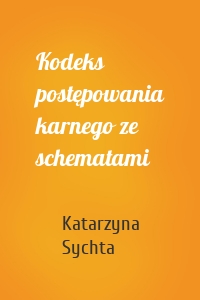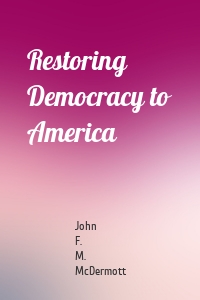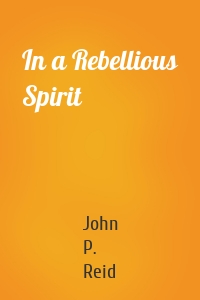Юриспруденция, право
7421 кн.
Human Rights Under African Constitu...
Some of the most massive and persistent violations of human rights occur in African nations. In Human Rights Under African Constitutions: Realizing the Promise for Ourselves , scholars from a wide range of fields present a sober, systematic assessment of the prospects for legal protection of human rights in Africa. In a series of detailed and highly contextual studies of Ethiopia, Ghana, Guinea, Morocco, Mozambique, Nigeria, Rwanda, Senegal, South Africa, Sudan, and Uganda, experts seek to...
| Автор | Группа авторов |
Creating Human Rights
Selected by Choice magazine as an Outstanding Academic Title Creating Human Rights offers the first systematic study of a pioneering women's refugee movement and its challenge, as an international trigger case, to more conventional paths toward human rights policy development. Lisa S. Alfredson argues that such cases, which unfold in the context of a specific country and have profound impacts on international human rights efforts, have been neglected in research and pose a challenge to...
| Автор | Lisa S. Alfredson |
Heavenly Ambitions
In the popular imagination, space is the final frontier. Will that frontier be a wild west, or will it instead be treated as the oceans are: as a global commons, where commerce is allowed to flourish and no one country dominates? At this moment, nations are free to send missions to Mars or launch space stations. Space satellites are vital to many of the activities that have become part of our daily lives—from weather forecasting to GPS and satellite radio. The militaries of the United...
| Автор | Joan Johnson-Freese |
Human Rights or Global Capitalism
The fall of communism in the late 1980s and the end of the Cold War seemed to signal a new international social order built on pluralist democracy, the rule of law, and universal human rights. But the window of opportunity for creating this more just, more equal, and more secure world slammed shut just as quickly as it opened. Rather than celebrate the triumph of democracy over autocracy, or political freedom over totalitarian rule, the West exulted in the victory of capitalism over communism....
| Автор | Manfred Nowak |
Mexico's Human Rights Crisis
Lawless elements are ascendant in Mexico, as evidenced by the operations of criminal cartels engaged in human and drug trafficking, often with the active support or acquiescence of government actors. The sharp increase in the number of victims of homicide, disappearances and torture over the past decade is unparalleled in the country's recent history. According to editors Alejandro Anaya-Muñoz and Barbara Frey, the «war on drugs» launched in 2006 by President Felipe...
| Автор | Группа авторов |
Dirty Dealing
"Cartwright tells the story of the Chagra brothers, Lee and Joe, as they get mixed up with the drug-running community along the border and in short order find themselves hopelessly entangled in a net cast by the DEA. Even readers unfamiliar with the well-publicized events of the book or of the dark, lawless aspect that often rules El Paso will find themselves pulled along by the plot: brigands and intrigue leap from almost every page, and the story just gets wilder the further into it you...
| Автор | Gary Cartwright |
Techniques of Vigilance
This is a definitive martial arts manual on the principles and methods of effective police self-defense.Designed as a martial arts textbook, it details, clearly and concisely, the complete range of self-defense techniques for the law enforcement officer. Each chapter begins with an overview of the material to be covered, and topics range from basic philosophy to advanced close-quarter fighting.The text is directed to one purpose: providing a curriculum of self-defense to aid the police officer...
| Автор | Kevin Parsons |
Life During Wartime
"Together, the writers sound a sobering warning: the American government is an iron fist in a velvet glove whose purpose remains preserving the status quo and enriching the rich."— Publishers WeeklyWhat happens when the techniques of counterinsurgency, developed to squash small skirmishes and guerrilla wars on the border of Empire, blend into the state's apparatus for domestic policing? In Life During Wartime, fifteen authors and activists reflect on the American domestic...
| Автор | Группа авторов |
Restoring Democracy to America
If the current economic malaise accomplishes nothing else, it should help awaken us all to the realization that our country has been on a path of self-destructive behavior for several decades—a reversal of the progressive path that had made major gains in economic and political equality for a large majority of the U.S. population starting in the 1870s. It is John McDermott’s purpose in this ambitious book to explain why that reversal happened, how society has changed in...
| Автор | John F. M. McDermott |
In a Rebellious Spirit
A fresh view of the legal arguments leading to the American Revolution, this book argues that rebellious acts called "lawless" mob action by British authorities were sanctioned by "whig law" in the eyes of the colonists. Professor Reid also holds that leading historians have been misled by taking both sides' forensic statements at face value. The focus is on three events. First was the Malcom Affair (1766), when a Boston merchant and his friends faced...
| Автор | John P. Reid |


